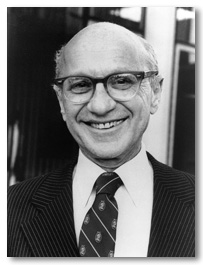More Than Just a Numbers Man
- FATHER RAYMOND J. DE SOUZA
Economics has lost one of its great practitioners and technical masters. But the loss is greater than that; the humane society has lost a champion, and liberty has lost a friend.
 |
|
Milton Friedman
(1912-2006) |
I first read Milton Friedman as an undergraduate in economics. But I kept reading him long after I was no longer interested in the minutae of the money supply — the mastery of which earned Prof. Friedman his 1976 Nobel Prize in Economics.
I kept reading Friedman because he was in the great tradition of humane economists — economists who practiced the discipline as if human beings mattered. A perennial temptation for economists is to make the discipline more like physics, removing unpredictable elements of culture, history, religion and politics from their models. Friedman did believe economics to be a science, but a particular kind of science.
“Fundamentally, economics is a science, like physics, like chemistry,” he told the Wall Street Journal last summer. “It’s a science about how human beings organize their co-operative activities.” Was that his preferred definition of economics? He replied: “Well, the standard definition is the study of how a society organizes its resources” (my italics).
The difference between the standard definition — “society organizes” — and Friedman’s – “human beings organize” – made all the difference. In order to make predictions, economics has to retreat to aggregates, and so we hear about how “society” ought to save more, or invest more, or do more to alleviate poverty. Friedman tirelessly pointed out that “society” does not save or invest or do anything else, but that individuals make those choices freely, and so it is important to pay attention to the incentives they face in making those choices.
Without choices there can be no freedom, and Friedman was above all a defender of liberty. Liberty was a proper part of human nature, he argued, and just as freedom ought to be promoted in politics or the press, so to it ought to be valued in the economic sphere. He was an unabashed libertarian, so he parted company with those who see freedom as a means to the good, rather than the ultimate good in itself. Yet in calling attention to the importance of economic liberty, he did a great service to all those who wish to build a more humane society, one which promotes responsibility and virtue, allows room for human creativity to flourish and space for poor to be included in the circle of productivity.
He was criticized by those who considered his anti-statist ideas to be detrimental to the poor, but Friedman did not consider a state bureaucracy the only, let alone the best, friend to those in need. He thought those in need might benefit from actual friends, personal support and opportunities to exercise initiative — all of which could be smothered by a state grown too large.
He was an advocate of the negative income tax, alternately known as a guaranteed annual income. It helped those who needed help, but also helped them to help themselves. Friedman did not consider the poor to be any less worthy of economic liberty.
The Catholic theologian Michael Novak, who set out to show how the ideas championed by Friedman were in large part compatible with Christian orthodoxy, wrote that economic liberty was the “second liberty.” The first liberty is religious liberty, for if a person is not free in his conscience he cannot be said to be free anywhere else. (Economic liberty is second, not because it is intrinsically more important than freedom of speech, but because the economy is where we spend most of our day.)
In a monograph entitled Is Capitalism Humane?, Friedman wrote that “a set of social institutions that stresses individual responsibility, that treats the individual ... as responsible for and to himself, will lead to a higher and more desirable moral climate.”
Friedman advocated a culture of liberty, responsibility and virtue. In that sense he was not an economist in the narrow sense of today’s mathematicians and model-makers, but a political economist like Adam Smith and the other fathers of the discipline — moral philosophers looking at social questions.
Economics, liberated from its contemporary narrowness, can address truly great questions about how “human beings organize their co-operative activities.” It is a cause for wonder that such vast co-operation is not only possible, but routine — think of all the independent actors required to get this newspaper to your breakfast table.
Friedman never lost his sense of wonder about what human ingenuity was capable of doing. The economy was just one arena in which that took place. Economics has lost one of its great practitioners and technical masters. But the loss is greater than that; the humane society has lost a champion, and liberty has lost a friend.
 This is Meaghen Gonzalez, Editor of CERC. I hope you appreciated this piece. We curate these articles especially for believers like you.
This is Meaghen Gonzalez, Editor of CERC. I hope you appreciated this piece. We curate these articles especially for believers like you.
Please show your appreciation by making a $3 donation. CERC is entirely reader supported.

Acknowledgement
Father Raymond J. de Souza, "More than just a numbers man." National Post, (Canada) November 17, 2006.
Reprinted with permission of the National Post and Fr. de Souza.
The Author
Father Raymond J. de Souza is the founding editor of Convivium magazine.
Copyright © National Post



